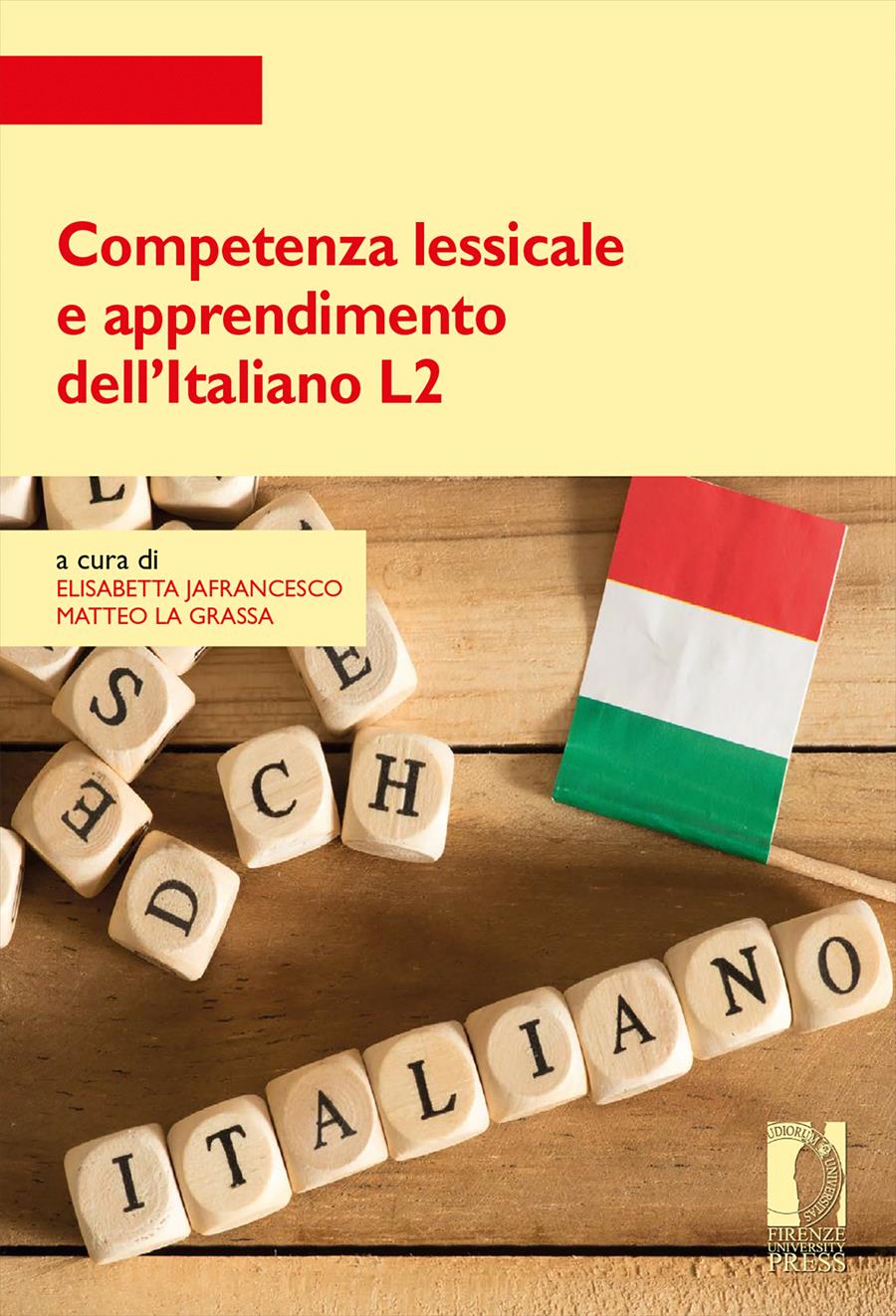- Competenza lessicale e apprendimento dell’Italiano L2
- Edited by Elisabetta Jafrancesco, Matteo La Grassa
Insegnare (lessico del)le microlingue: specificità nell’insegnamento e nelle strategie didattiche
- Elena Ballarin
- © 2021 Author(s) |
- CC BY 4.0
- DOI: 10.36253/978-88-5518-403-8.08
In the teaching of micro-languages, vocabulary teaching constitutes the main challenge for teachers. The ideal micro-language teacher should be a competent professional both in the discipline of specialization and in the corresponding micro-language. This type of teacher should be a graduate in languages with specialized training also in a different disciplinary sector, or a specialist with language and teacher training. In the Italian educational reality the micro-language teacher is (it is hoped) a graduate in languages - but not necessarily specialized in language teaching. The teacher-learner relationship is vitiated by a sense of imperfection due to the teacher's lack of training in the discipline concerned and the learner's lack of training in the language. This limit can be overcome in the teaching of scientific-professional micro-languages by means of a collaborative teaching model. The challenge becomes more difficult, when teaching disciplinary micro-languages, because learners do not have full mastery of the non-language discipline they are acquiring. This contribution aims to explore the specificities that arise when different didactic realities manifest critical aspects.
- Keywords:
- teaching of micro-languages,
- lexis,
- collaborative teaching,
Ca' Foscari University of Venice, Italy - ORCID: 0000-0002-0783-3756
- Adamo, G., Della Valle, V. (a cura di) 2003. Innovazione lessicale e terminologie specialistiche . Firenze: Olschki.
- Andorno, C., Grassi, R. (a cura di) 2016. Le dinamiche dell’interazione. Prospettive di analisi e contesti applicativi. Milano: AItLA (Associazione Italiana di Linguistica Applicata).
- Balboni, P. E. 1999. Dizionario di glottodidattica. Perugia: Guerra Edizioni.
- Balboni, P. E. 2000. Le microlingue scientifico-professionali. Natura e insegnamento. Novara: UTET.
- Balboni, P. E. 2007a. “Didattica delle microlingue e uso veicolare della lingua: il ruolo della traduzione”. In Tradurre le microlingue scientifico-professionali. Riflessioni teoriche e proposte didattiche , a cura di P. Mazzotta, L. Salmon, 49-63. Novara: UTET.
- Balboni, P. E. 2007b. Tecniche didattiche per l’educazione linguistica. Novara: UTET.
- Baldi, B., Savoia, L. M. 2018. Linguistica per insegnare. Mente, lingue e apprendimento. Bologna: Zanichelli.
- Ballarin, E. 2017a. L’italiano accademico. Uno studio sulla glottodidattica dell’italiana lingua di studio all’universit. a studenti in mobilit. internazionale. Saarbrücken: Edizioni Accademiche Italiane.
- Ballarin, E. 2017b. “L’esperienza del CLA di Venezia. Italiano accademico Lingua come Disciplina: comprensione e produzione orale”. In Digital Resources, Creativity and Innovative Methodologies in Language Teaching and Learning , edited by A. T. Damascelli, 410-8. Newcastle upon Tyne: Cambridge Scholars Publishing
- Ballarin, E. 2018. “Le microlingue scientifico-professionali e disciplinari: microlingue per insegnare, studiare e lavorare”. In L’educazione linguistica oggi. Nuove sfide tra riflessioni teoriche e proposte operative. Scritti in onore di Paolo E. Balboni, a cura di M. Santipolo, P. Mazzotta, 87-92. Novara: UTET-De Agostini Scuola.
- Ballarin, E., Nitti, P. 2020. “Microlingue scientifiche, professionali, disciplinari e lingua accademica. Una proposta di classificazione”. In Linguaggi settoriali e specialistici. Sincronia, diacronia, traduzione, variazione. Atti del XV Congresso SILFI, Società Internazionale di Linguistica e Filologia Italiana (Genova, 28-30 maggio 2018), a cura di J. Visconti, M. Manfredini, L. Coveri, 21-9. Firenze: Franco Cesati Editore.
- Berruto, G. 2004. Prima lezione di sociolinguistica. Roma-Bari: Editori Laterza.
- Berruto, G., Berretta, M. 2001. Lezioni di sociolinguistica e linguistica applicata. Napoli:Liguori.
- Cavagnoli, S. 2007. La comunicazione specialistica. Carocci: Roma.
- Ciliberti, A., Anderson, L. (a cura di) 1999. Le forme della comunicazione accademica. Ricerche linguistiche sulla didattica universitaria in ambito umanistico. Milano: Franco Angeli.
- Corda, A., Marello, C. 2004. Lessico. Insegnarlo e impararlo. Perugia: Guerra Edizioni.
- Cortelazzo, M. (a cura di) 1997. Annali del lessico contemporaneo italiano. Neologismi 1996. Padova: Esedra.
- Desideri, P., Tessuto G. (a cura di) 2011. Il discorso accademico. Lingue e pratiche disciplinari. Urbino: Quattroventi.
- Gotti, M. 1991. I linguaggi specialistici: caratteristiche linguistiche e criteri pragmatici. Firenze: La Nuova Italia.
- Gualdo, R., Telve, S. 2011. Linguaggi specialistici dell’italiano. Roma: Carocci.
- Linell, P., Luckmann, T. 1991. “Asymmetries in Dialogue: Some Conceptual Preliminaries”. In Asymmetries in Dialogue, edited by I. Markova, K. Foppa, 1-20. Hemel Hempstead: Harvester Wheatssheaf.
- Nitti, P. 2017. “Insegnare la microlingua della scuola”. Scuola e Didattica 7: 36-40.
- Nitti, P., Ballarin, E. 2020. “Le LSP nella didattica della lingua italiana. Un’indagine sulla dimensione operativa”. In Teaching Languages for Specific and Academic Purposes. English, Deutsch, Italiano. International Symposium, Bozen-Bolzano, 29 June 2018, edited by E. Bonetto, M. J. Ennis, D. Unterkofler, 127-40. Bozen-Bolzano: bu,press.
- Orletti, F. 2000. La conversazione diseguale. Potere e interazione, Roma: Carocci.
- Porcelli, G. 1994. Principi di glottodidattica. Brescia: Editrice La Scuola.
- Porcelli, G., Cambiaghi, B., Jullion, M.-C., Caimi, A. 1990. Le lingue di specializzazione e il loro insegnamento. Problemi teorici e orientamenti didattici. Milano: Vita e Pensiero.
- Scelzi, R. 2009. “Nel linguaggio specialistico”. Studi di Glottodidattica 3: 118-40.
- Serragiotto, G. 2014. Dalle microlingue disciplinari al CLIL. Novara: UTET.
Chapter Information
Chapter Title
Insegnare (lessico del)le microlingue: specificità nell’insegnamento e nelle strategie didattiche
Authors
Elena Ballarin
Language
Italian
DOI
10.36253/978-88-5518-403-8.08
Peer Reviewed
Publication Year
2021
Copyright Information
© 2021 Author(s)
Content License
Metadata License
Bibliographic Information
Book Title
Competenza lessicale e apprendimento dell’Italiano L2
Editors
Elisabetta Jafrancesco, Matteo La Grassa
Peer Reviewed
Number of Pages
162
Publication Year
2021
Copyright Information
© 2021 Author(s)
Content License
Metadata License
Publisher Name
Firenze University Press
DOI
10.36253/978-88-5518-403-8
ISBN Print
978-88-5518-402-1
eISBN (pdf)
978-88-5518-403-8
Series Title
Strumenti per la didattica e la ricerca
Series ISSN
2704-6249
Series E-ISSN
2704-5870
